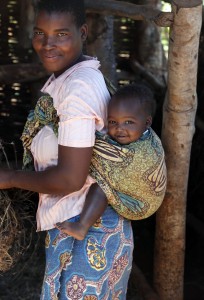World Ark senior editor Austin Bailey and photographer Russ Powell are visiting Malawi this week to report on projects there.

In cities and villages, among old and young, the women of Malawi honor tradition by wearing the chitenje. This brightly colored swath of cotton comes in countless colors and patterns, but is worn in only two ways. Practically all women wrap them around their waists, with two magical tucks that keep them in place without buttons, zippers or snaps. Mothers in rural areas use a second chitenje to tie babies on their backs, freeing hands for hauling, cooking and other work.
In the capitol city of Lilongwe, professional women wear skirts and high-heeled shoes, but wrap zitenje over their suits when they leave the office. (Zitenje is the plural form for chitenje in the Chichewa language spoken in Central and Southern parts of the country.) Not only is the chitenje traditional, it's also considered by many to be the only moral way for women in Malawi to dress, explained Grace Phili, a field officer for Heifer who often wears a chitenje over jeans when she travels over bumpy dirt roads to project sites by motorbike. Although Malawi is becoming more modern in terms of gender issues, many still believe women who shirk the traditional dress also shirk their morals. "In the villages, if you wear pants, people say, 'She is a woman, but she wears the clothes of a man,'" Phili said.

Giving zitenje is considered very respectful and generous, and they're the common gift at rural weddings. Many women in Malawi complement zitenge with a matching head wrap called a mpango. On special occasions, women wear the chitenje with matching mpango and blouse all made from the same cloth. Malawi's new president, Joyce Banda, always wears a chitenge outfit with a matching wrap over her shoulder and mpango.
Watch Heifer Malawi field officer Grace Phili demonstrate wrapping the chitenje in the video below.